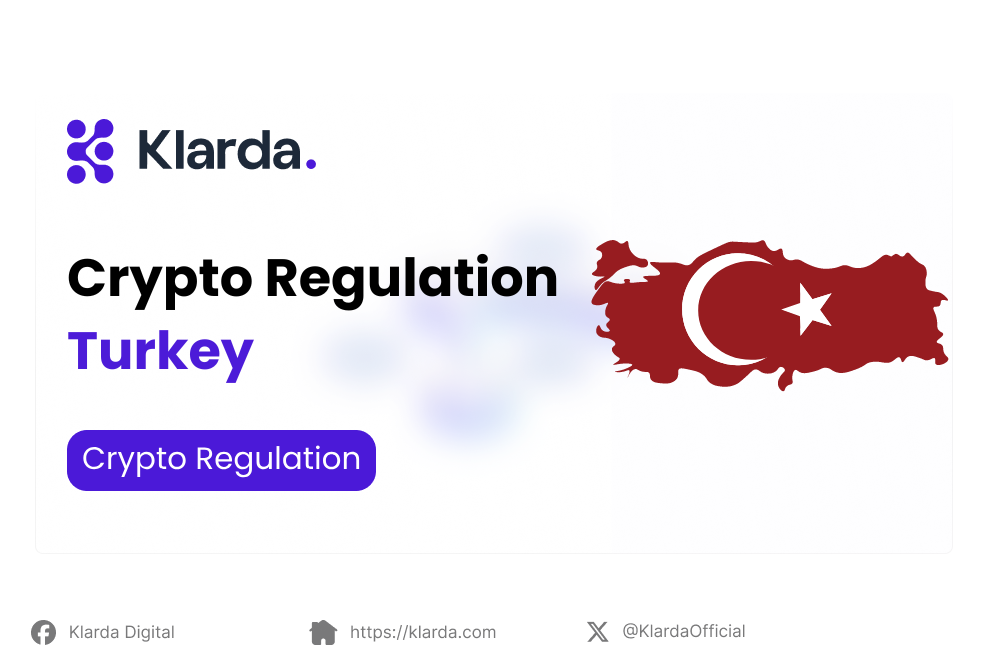Crypto Regulation in Turkey
Turkey crypto regulation is quite loose and cannot be overestimated because no official regulations or legal documents have been issued.
Turkey is one of the largest cryptocurrency financial markets in the world. However, Turkey crypto regulation has not been highly appreciated because it has not yet agreed on important terms in managing and controlling the cryptocurrency market. Let's learn and evaluate these regulations through Klarda's article below.

KEY TAKEAWAYS
- Turkey is one of the world's largest financial markets.
- Currently, Turkey crypto regulation is officially adopted as Regulations on the Use of Cryptoassets in Payments. This regulation was issued in April 2021.
- Currently, Turkey has not yet finalized important provisions in managing and controlling the cryptocurrency market. This can facilitate illegal financial activities such as money laundering or financing terrorist groups.
TURKEY'S CRYPTOCURRENCY MARKET
Turkey is one of the fastest cryptocurrency adoption countries worldwide. As of May 2020, Turkey's Information and Communications Technology Agency reported that approximately 5 million people in the country currently own cryptocurrencies.
The explanation for the explosion and rapid development of the cryptocurrency market in this country even though cryptocurrency exchanges have just been established in 2021 is due to high inflation as well as a decline in cryptocurrency prices. The price of the Lira has been going on for many years. This prompted Turkish citizens and investors to look for a new currency to replace it.
In 2013, with the emergence and explosion of the cryptocurrency market, entities and trading activities were managed and controlled by Turkey based on the Capital Market Law No. 6362 issued to manage Securities Settlement Systems, Electronic Money Institutions and Payment Services (2013). Despite being the 4th country in the world in terms of cryptocurrency trading volume, as of 2021, the government has not yet introduced any official crypto regulation. And Capital Market Law No. 6362 is also not considered a very strict and serious regulation on cryptocurrencies.
In April 2021, the Turkish government issued Regulations on the Use of Cryptoassets in Payments. This is considered Turkey's first official document related to crypto assets. However, the country's government's efforts to manage the cryptocurrency market are not enough. Turkey has been gray-listed by the financial watchdog Financial Action Task Force (FATF). This is a list of countries with the highest risk of financial risks, money laundering and criminal groups in the world due to not tightening management and control of this cryptocurrency market.
Currently, as of 2024, Turkey has been proposing clearer and more transparent draft laws and regulations on cryptocurrencies to strengthen the country's investment rating.
REGULATIONS ON CRYPTOCURRENCY TRADING AND MINING
Cryptocurrency regulations issued in Turkey define cryptocurrencies as intangible assets created using Blockchain technology. But cryptocurrencies are not considered as electronic money, payment instruments, securities, etc. Turkey crypto regulation is considered as not prohibiting cryptocurrencies and cryptocurrency exchange and trading activities. However, it prohibits the following activities:
- Use cryptocurrency as a direct or indirect payment tool.
- Banks, payment institutions or cryptocurrency service providers that provide direct or indirect cryptocurrency payment models are not accepted.
- It is not acceptable for payment institutions or cryptocurrency providers to assist cryptocurrency service providers to perform intermediary activities.
In addition, Turkey crypto regulation also regulates the responsibilities and obligations of cryptocurrency service providers, exchanges as well as other derivatives companies. Accordingly, these subjects are considered responsible parties in preventing money laundering crimes as well as preventing terrorist financing. Obligations can be listed as:
- Implement procedures to learn and verify customer identity
- Report suspicious transactions that may harm the financial market to the competent authority.
- Store information, documents, books or transaction records and provide them immediately upon request.
- Periodically report and notify information to the Financial Crime Investigation Board of Türkiye.
The authority that oversees the implementation of these turkey crypto regulations is the FCIB. This agency belongs to the Ministry of Finance and Treasury of the Republic of Turkey.
Cryptocurrency mining is still not well regulated in Turkey.
TURKEY REGULATIONS ON TAXES ON CRYPTOCURRENCY
Turkey crypto regulation has not yet issued any clear and specific direct regulations. As a rule, the taxation of assets depends on the nature of the assets and how those things are traded. However, according to the definition of cryptocurrency, cryptocurrency is an intangible asset and there are no legal documents issued directly regulating this issue, so the taxation of cryptocurrency in Turkey is illegal. is still not certain.
The key point to draw here is that the Turkish government should issue clear documents and policies on taxation of income from cryptocurrencies. This could significantly improve tax revenue for the country.
OTHER REGULATIONS
For individuals and organizations participating in the Turkish cryptocurrency market, it is important to note that they must apply for a license from this country's CMB agency to ensure legality. This is stated in CML- Capital Market Law 6362 and Turkey crypto regulation.
Requirements for ownership and investment in the cryptocurrency market are unlimited, except for agencies with specific positions such as collective investment funds that are prohibited from investing in the cryptocurrency market.
Above is the entire Turkey crypto regulation that Klarda wants to introduce to everyone. You can refer and consider to make the right investment decision
Updated 9 months ago